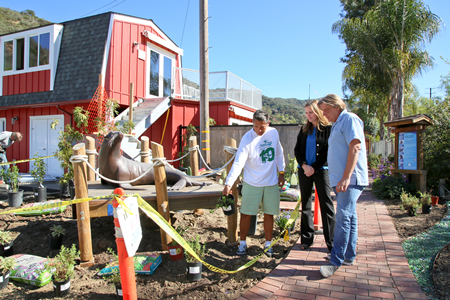By Donna Furey | LB Indy

After observing Pacific Marine Mammal Center staff releasing a sea lion into the ocean from a bluff overlooking a Laguna Beach cove, Ted Bauer visited the rescue operation on Laguna Canyon Road last year and inquired how his foundation might help the center. The result was a grant of an undisclosed amount from the Houston-based Charles T. Bauer Foundation, where Bauer is a trustee.
The grant made possible recent renovations that PMCC development director Melissa Sciacca calls “ a dream which could never had come true” without such a windfall.
Bauer will wield the ceremonial scissors this Saturday, April 5, cutting a ribbon at the center’s 3 p.m. open house, 20612 Laguna Canyon Rd. Efforts to reach Bauer by phone through the foundation were not returned.
The foundation named after Bauer’s father, the late Charles T. Bauer, who co-founded the AIM mutual fund company, holds over $145.4 million in assets and disbursed 49 grants ranging in size from $5,000 to $1.8 million in 2012, the most recent figures publicly available. Its grants fund educational projects ranging from the Johns Hopkins Surgery Center to the Yeardley Love Lacrosse Scholarship at Notre Dame Preparatory school in Towson, Md.
While the recent renovations will not expand PMMC’s capacity to treat more animals, they will make the work easier for the staff and more inviting to the center’s many visitors, Sciacca said. The intensive care unit has been reconfigured to maximize efficiency. Visitor restrooms have been added along with a multi-purpose room, an observation deck and a permanent gift shop, which is a reliable source of income for the center.
The new multi-purpose room will be used for membership events, corporate programs and the many educational activities the center offers such as boy and girl scout events, their Kids Club and Camp Pinniped and school field trips, some of which are made possible using funds from the yearly fundraiser, the Marine Mammal cabaret gala. Board member and gala chair Mary Ferguson says PMMC has made a practice of underwriting field trips to the center for “underserved” student classes, many of whom become contributors by pledging to the center’s Change the Life of a Seal program in their classrooms. The center also fundraises to support its operational expenses, which include fish, medicine, and gas for the rescue trucks.
PMMC reported a $515,435 surplus in 2011 in its IRS filing, according to Guidestar.org, a website that tracks non-profit organizations. The surplus was invested in PMMC’s endowment, explained Ferguson.
Even with the recent expansion, it’s hard to believe that so much goes on in such a small place dedicated to the rescue and rehabilitation of sea mammals. Somehow the facility managed to rehabilitate 372 animals last year during an unusual die-off of sea lion pups with as many as 167 there at one time, according to Sciacca.
Since all marine mammals are federally protected, only volunteers or workers from licensed entities, like PMCC, can touch the animals. They answer calls about injured or sick animals from San Onofre to Seal Beach. Rehabilitated animals are generally released at Crescent Bay, where it is is quiet, or at the Montage, where a viewing deck allows the curious to watch the release without getting close enough to stress the animals. During rehabilitation, the staff tries to minimize human contact in order to keep the animals as wild as possible.
Some of the rehabilitated animals are released with a tracking device attached to their backs. The GPS devices track the animals’ movements for six months, monitoring how far they range to feed and where they establish a home base. The data is collected for research conducted by the National Marine Fisheries Service and organizations such as the Riverhead Foundation, based in Long Island, N.Y., which also researches and rehabilitates endangered marine animals.
PMMC is establishing its own data base and has access to more tracking devices thanks the center’s executive director, Keith Matassa, and his relationship with Robert DiGiovanni, Riverhead’s director and senior biologist.
“It’s symbiotic relationship,” said Matassa, who previously was program coordinator for the University of New England’s Marine Mammal Rehabilitation Center.
The research collaborations could be useful in predicting and preparing for a future mortality event like the one that resulted in the center being overrun with malnourished sea lion pups in 2013. Fortunately, current data does not indicate a repeat of last year’s events, he said.
The event is free. RSVP to Lindsey Repp at 949-494-3050 or [email protected]. Parking is limited.




